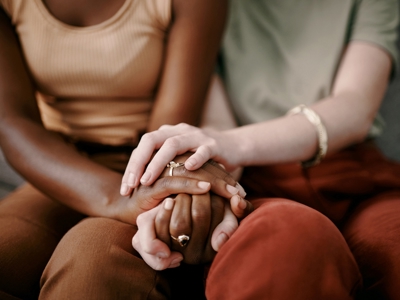
Supporting migrant victims-survivors of domestic abuse: International Day for the Elimination of Violence Against Women
As part of our Elimination of Violence Against Women blog series, Nath Gbikpi and John Crowley reflect on the progress made in the UK to protect migrant victim-survivors of domestic abuse, and the work that remains to be done.
Posted on 27 November 2024
This blog post contains themes of domestic abuse.
Vulnerability of migrant victims-survivors of domestic abuse
Migrants with insecure immigration status are particularly vulnerable to domestic abuse, as their immigration status is frequently weaponised by abusers. Abusers will deliberately avoid regularising their victim’s immigration status; withhold critical information about their status; and/or threaten to have them removed from the UK to coerce compliance and silence. Immigration status is effectively used as a tool of control and abuse.
The “No Recourse to Public Funds” (NRPF) condition, that prevents the majority of migrants from applying for benefits in the UK, further compounds their vulnerability. Victims will often feel unable to leave an abusive household, as they cannot access vital financial support to obtain independent housing and afford other essential living needs.
For many, a combination of their insecure immigration status and lack of a financial safety net result in prolonged exposure to harm, as dependence traps them in dangerous situations.
Current measures to protect migrant victims-survivors of domestic abuse
The UK government has long recognised the particular vulnerabilities of migrant victims-survivors of domestic abuse, introducing measures to address these challenges.
As far back as 1999, the government introduced a Domestic Violence Concession, allowing those in the UK with visas as partners of British citizens or individuals with settled status to apply for indefinite leave to remain if their relationship had broken down due to domestic abuse. This concession then became an Immigration Rule, and now sits in Appendix Victims Domestic Violence (VDA) of the Immigration Rules.
The introduction of the Destitution Domestic Violence (DDV) Concession in 2012 further addressed financial barriers, granting eligible victims-survivors of abuse independent immigration status and access to public funds (benefits) for three months, during which time they can apply for longer-term leave. This concession has now been renamed the Migrant Victims of Domestic Abuse Concession (MVDAC).
Persistent advocacy, policy work, and litigation have led to the expansion of the measures introduced by the government. Partners of refugees and some partners granted leave under the EU Settlement Scheme can now apply for indefinite leave if their relationship has broken down due to domestic abuse. Following the case of AM v SSHD [2022] EWHC 2591, in which Nath Gbikpi was the instructing solicitor, victims of transnational marriage abandonment who were abandoned abroad can now also apply for indefinite leave to enter to return to the UK. The scope MVDAC has also been expanded to allow partners of those on work or student visas to be granted leave for three months with recourse to public funds. These victims-survivors cannot, however, go on to apply for indefinite leave on this basis.
Ongoing issues with measures protecting victims-survivors of domestic abuse
All these measures set out above represent crucial progress, however gaps remain that continue to prevent many victims-survivors from accessing protection. Issues include:
- Inability of relatives other than partners, who are victims of domestic abuse and have a visa which makes them dependent on their abuser, to apply under the MVDAC or under Appendix VDA in their own right. John Crowley and Nath Gbikpi are currently representing an adult child in the UK with a student dependent visa with a Judicial Review challenging the restrictive scope of the MVDAC.
- Children applying for indefinite leave as dependants need to show that they can be maintained and accommodated in the UK without relying on public funds. For obvious reasons, many cannot meet this requirement, undermining the effectiveness of a measure meant to protect victims-survivors of abuse.
- Lack of right of appeal against a negative decision in an application for indefinite leave as a victim of domestic abuse. This prevents victims-survivors of abuse from giving evidence about their abuse in front of an independent Tribunal when their account has not been accepted. It also means that some will feel forced to apply for leave on a different basis, for example on the basis of their parental relationship to a British child, to ensure that they get a right of appeal if refused, despite this meaning that they will be granted limited leave rather than indefinite leave to remain.
- Lack of sufficient measures to protect victims-survivors of abuse whose abuser deliberately prevented them from regularising their status in the UK.
- Difficulties faced by British children of victims-survivors of abuse to get British passports without the consent of the abusive father.
If you have been affected by any of the issues above, do not hesitate to contact Nath Gbikpi on ngbikpi@leighday.co.uk and John Crowley on jcrowley@leighday.co.uk.




